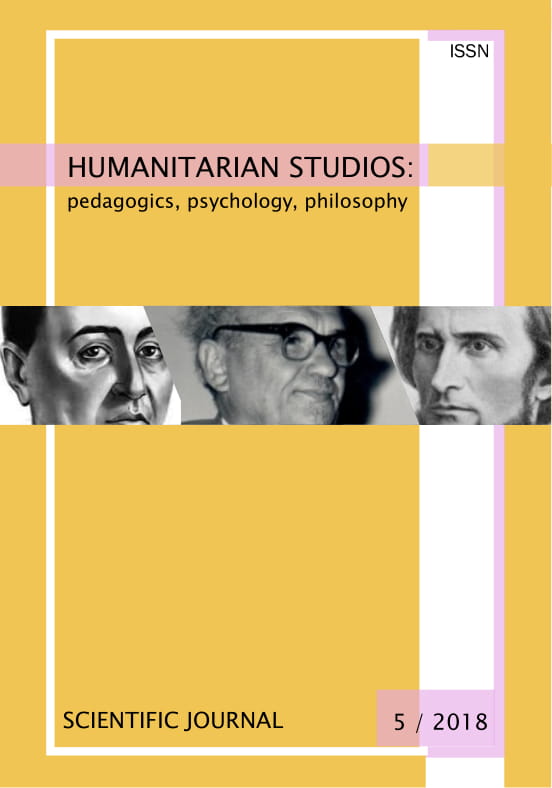Продуктивні моделі взаємодії в системі «соціальний працівник – клієнт», побудовані на основі трансакційної парадигми
DOI:
https://doi.org/10.31548/hspedagog2019.02.072Анотація
Обґрунтовуються продуктивні моделі взаємодії в системі «соціальний працівник – клієнт», побудовані на основі трансакційної парадигми. Показано, що життєві проблеми клієнта можуть виникати у межах одної з соціальних ролей і не проявлятися у межах другої ролі, коли конкретна життєва проблема може бути виражена, породжена, а також вирішена тільки в сфері однієї з особистісних ролей. При цьому життєві проблеми можуть також виникати на рівні декількох ролей у контексті їх різного комбінування, що дещо ускладнює використання трансакційного аналізу сфері взаємодії «соціальний працівник – клієнт». Розглядаються дев'ять моделей соціальної взаємодії, які являють особливу цінність у контексті професійної підготовки майбутніх соціальних працівників, що потребує розробки навчального курсу «Моделі соціальної взаємодії в контексті трансакційної парадигми», в рамках якого можна широко використовувати соціально-рольові тренінги.
Посилання
Bern Э. Transaktnyi analyz v psykhoterapyy: Systemnaia yndyvy-dualnaia y sotsyalnaia psykhoterapyia [Transactional analysis in psychotherapy: Systemic individual and social psychotherapy]. Moskva: Akademycheskyi Proekt, 2006. 320.
Bern Э. Yhry, v kotorye yhraiut liudy. Liudy, kotorye yhraiut v yhry [Games in which people play. People who play games]. Moskva: Yzd. TsOTs, 1996. 397.
Burlan P. Symoron yz pervykh ruk, yly kak dostych toho, cheho dostych nevozmozhno [Simoron first-hand, or How to achieve what can not be achieved]. Sankt-Pyterburh: «Praim-EVROZNAK», 2006. 320.
Symonov P.V. Temperament, kharakter, lychnost [Temperament, character, personality]. Moskva: Pedaho-hyka, 1984. 160.
Maturana H.R., Valera F.J. Au-topoiesis and Cognition. London, Bos-ton, Dortrecht: D. Reidel Publising Co., 1980. 234.
Завантаження
Опубліковано
Номер
Розділ
Ліцензія
Стосунки між правовласниками і користувачами регулюються на умовах ліцензії Creative Commons Із Зазначенням Авторства – Некомерційна – Поширення На Тих Самих Умовах 4.0 Міжнародна (CC BY-NC-SA 4.0):https://creativecommons.org/licenses/by-nc-sa/4.0/deed.uk
Автори, які публікуються у цьому журналі, погоджуються з наступними умовами:
- Автори залишають за собою право на авторство своєї роботи та передають журналу право першої публікації цієї роботи на умовах ліцензії Creative Commons Attribution License, котра дозволяє іншим особам вільно розповсюджувати опубліковану роботу з обов'язковим посиланням на авторів оригінальної роботи та першу публікацію роботи у цьому журналі.
- Автори мають право укладати самостійні додаткові угоди щодо неексклюзивного розповсюдження роботи у тому вигляді, в якому вона була опублікована цим журналом (наприклад, розміщувати роботу в електронному сховищі установи або публікувати у складі монографії), за умови збереження посилання на першу публікацію роботи у цьому журналі.
- Політика журналу дозволяє і заохочує розміщення авторами в мережі Інтернет (наприклад, у сховищах установ або на особистих веб-сайтах) рукопису роботи, як до подання цього рукопису до редакції, так і під час його редакційного опрацювання, оскільки це сприяє виникненню продуктивної наукової дискусії та позитивно позначається на оперативності та динаміці цитування опублікованої роботи (див.The Effect of Open Access).

